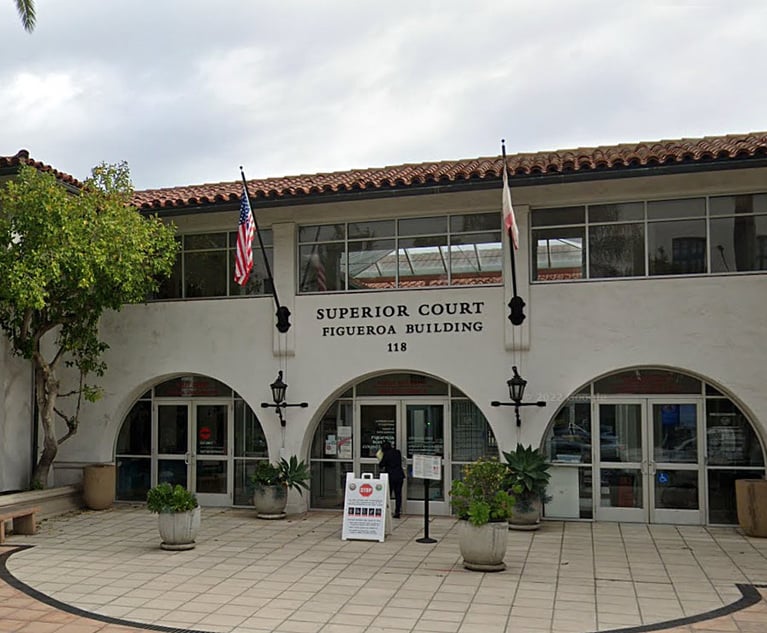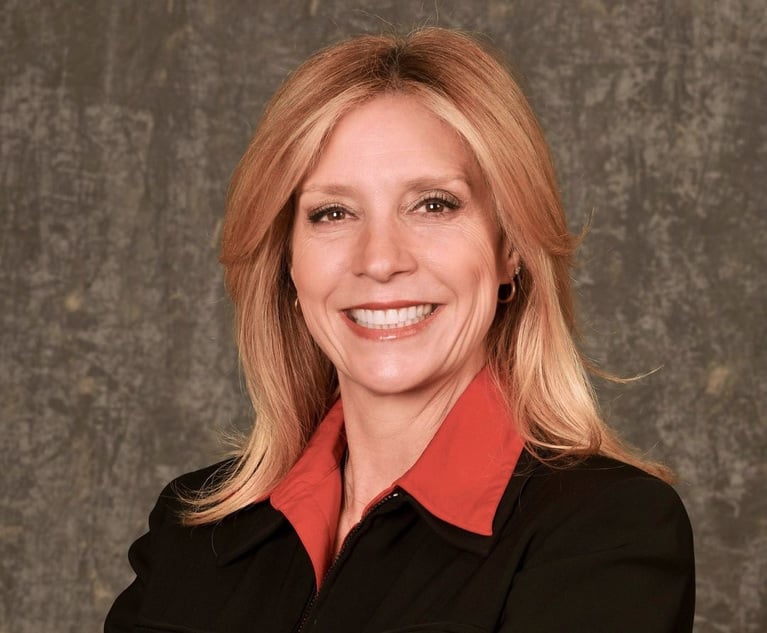 State Bar of California's logo.
State Bar of California's logo.California's Indigent Are Not Finding Legal Help, Bar Study Says
California bar officials expect the report's findings and recommendations to bolster the work of its Task Force on Access Through Innovation of Legal Services.
September 20, 2019 at 08:12 PM
4 minute read
Indigent California residents have more legal problems than wealthier counterparts but less access to legal professionals who could help them, a new survey released by the state bar shows.
The preliminary "technical" draft of the California Justice Gap Study includes the results from a bar-commissioned survey of 3,885 state residents conducted by the National Opinion Research Center (NORC) at the University of Chicago.
The findings mirror what past national studies have shown: poor residents are not finding or, in some cases, not looking for free or reduced-cost help they need with child custody, residential problems and other legal issues.
"Access to justice has been a problem in California for a long time," Alan Steinbrecher, the board of trustees' new chairman, said in a statement. "It's a nationwide and international problem. California has always been a leader on this issue, and we will continue to work on this challenge."
Among the survey's findings:
- Low-income Californians—those in a family of four making no more than $32,188, by definition—reported twice as many legal problems as their higher-earning counterparts.
- Of poorer Californians who reported having legal issues related to child custody or their children generally, more than two-thirds said the problem affected them "very much" or "severely." Other top legal issues with the biggest impact to respondents were tied to veterans affairs, income and government assistance and housing.
- Of low-income Californians with civil legal troubles, 27% received legal help with at least one issue. That compares with 34% of wealthier Californians who found legal assistance.
- Uncertainty about whether a problem constituted a legal issue and worries about cost were among the top reasons low-income Californians cited for not seeking help.
- Poor Californians are less likely than their wealthier counterparts to say that they can turn to the courts for help and that the justice system will treat them fairly.
The survey is part of a larger study, expected to be released by the end of the year, that will also review the types of cases legal aid organizations funded by the bar are handling. Study leaders say the final report will also include a survey of law students to understand the role of education debt on their career choices and information about the recruitment and retention of legal aid attorneys.
Bar officials expect the report's findings and recommendations to bolster the work of its Task Force on Access Through Innovation of Legal Services. The group is studying ways to expand the availability of legal services, potentially through increased use of technology and fee-sharing with nonlawyers.
The state bar's legal services trust fund commission this month tentatively approved $78 million in grants for 100 nonprofits offering legal aid services. The funding comes from the state-controlled equal access fund and interest on lawyers' trust accounts.
Read the California Bar's 2019 2019 Justice Gap Study:
||
Read more:
Correction: An earlier version of this report misstated the incidence of legal problems among poorer Californians. More than two-thirds of those residents who reported experiencing child custody or child-related legal issues said the problem affected them very much or severely. The report did not say that two-thirds of poorer Californians reported child custody or child-related legal issues.
This content has been archived. It is available through our partners, LexisNexis® and Bloomberg Law.
To view this content, please continue to their sites.
Not a Lexis Subscriber?
Subscribe Now
Not a Bloomberg Law Subscriber?
Subscribe Now
NOT FOR REPRINT
© 2024 ALM Global, LLC, All Rights Reserved. Request academic re-use from www.copyright.com. All other uses, submit a request to [email protected]. For more information visit Asset & Logo Licensing.
You Might Like
View All


Santa Barbara Judge Accused of Moonlighting as Attorney for Secretary/Girlfriend
4 minute readTrending Stories
- 1Tuesday Newspaper
- 2Judicial Ethics Opinion 24-85
- 3Decision of the Day: Administrative Court Finds Prevailing Wage Law Applies to Workers Who Cleaned NYC Subways During Pandemic
- 4Trailblazing Broward Judge Retires; Legacy Includes Bush v. Gore
- 5Federal Judge Named in Lawsuit Over Underage Drinking Party at His California Home
Who Got The Work
Michael G. Bongiorno, Andrew Scott Dulberg and Elizabeth E. Driscoll from Wilmer Cutler Pickering Hale and Dorr have stepped in to represent Symbotic Inc., an A.I.-enabled technology platform that focuses on increasing supply chain efficiency, and other defendants in a pending shareholder derivative lawsuit. The case, filed Oct. 2 in Massachusetts District Court by the Brown Law Firm on behalf of Stephen Austen, accuses certain officers and directors of misleading investors in regard to Symbotic's potential for margin growth by failing to disclose that the company was not equipped to timely deploy its systems or manage expenses through project delays. The case, assigned to U.S. District Judge Nathaniel M. Gorton, is 1:24-cv-12522, Austen v. Cohen et al.
Who Got The Work
Edmund Polubinski and Marie Killmond of Davis Polk & Wardwell have entered appearances for data platform software development company MongoDB and other defendants in a pending shareholder derivative lawsuit. The action, filed Oct. 7 in New York Southern District Court by the Brown Law Firm, accuses the company's directors and/or officers of falsely expressing confidence in the company’s restructuring of its sales incentive plan and downplaying the severity of decreases in its upfront commitments. The case is 1:24-cv-07594, Roy v. Ittycheria et al.
Who Got The Work
Amy O. Bruchs and Kurt F. Ellison of Michael Best & Friedrich have entered appearances for Epic Systems Corp. in a pending employment discrimination lawsuit. The suit was filed Sept. 7 in Wisconsin Western District Court by Levine Eisberner LLC and Siri & Glimstad on behalf of a project manager who claims that he was wrongfully terminated after applying for a religious exemption to the defendant's COVID-19 vaccine mandate. The case, assigned to U.S. Magistrate Judge Anita Marie Boor, is 3:24-cv-00630, Secker, Nathan v. Epic Systems Corporation.
Who Got The Work
David X. Sullivan, Thomas J. Finn and Gregory A. Hall from McCarter & English have entered appearances for Sunrun Installation Services in a pending civil rights lawsuit. The complaint was filed Sept. 4 in Connecticut District Court by attorney Robert M. Berke on behalf of former employee George Edward Steins, who was arrested and charged with employing an unregistered home improvement salesperson. The complaint alleges that had Sunrun informed the Connecticut Department of Consumer Protection that the plaintiff's employment had ended in 2017 and that he no longer held Sunrun's home improvement contractor license, he would not have been hit with charges, which were dismissed in May 2024. The case, assigned to U.S. District Judge Jeffrey A. Meyer, is 3:24-cv-01423, Steins v. Sunrun, Inc. et al.
Who Got The Work
Greenberg Traurig shareholder Joshua L. Raskin has entered an appearance for boohoo.com UK Ltd. in a pending patent infringement lawsuit. The suit, filed Sept. 3 in Texas Eastern District Court by Rozier Hardt McDonough on behalf of Alto Dynamics, asserts five patents related to an online shopping platform. The case, assigned to U.S. District Judge Rodney Gilstrap, is 2:24-cv-00719, Alto Dynamics, LLC v. boohoo.com UK Limited.
Featured Firms
Law Offices of Gary Martin Hays & Associates, P.C.
(470) 294-1674
Law Offices of Mark E. Salomone
(857) 444-6468
Smith & Hassler
(713) 739-1250







